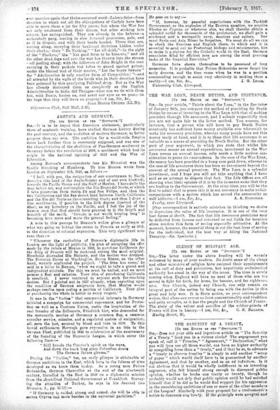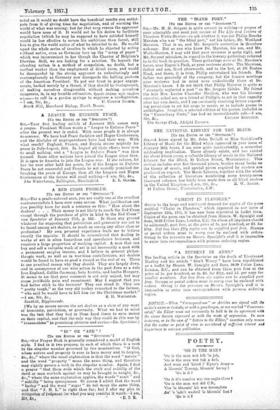THE SANCTITY OF A TREATY,
(To TEE EDITOS or THE " SPECTAT011."3 Ssp,—Does not your able and ingenious article on "The Sanctity of a Treaty " land you in a vicious circle? The engagement you speak of, call it "Promise," " Agreement," "Declaration," what you will (you use all three words), can have no higher authority or compelling force than a " treaty," and if that be so, to advocate a " treaty to observe treaties " is simply to add another " scrap of paper " which would itself hare to be guaranteed by another Agreement, and that by another, and so on ad infinitum. Is it not obvious that it would be wholly indifferent to an intending aggressor, who felt himself strong enough to disregard public opinion, whether lie broke one treaty or twenty, Though he probably would not defy that public opinion until he had satisfied himself that if he did so lie would find support for his aggression in the smouldering ambitions of one or more of the other members of the League? Similarly with your proposal for a twelvemonth's notice to denounce any treaty. If the principle were accepted and acted on it would no doubt have the beneficial results you antici- pate from it of giving time for negotiation, and of warning the world of 'what was coming; but for that very reason the aggressor would have none of it. It would not be his desire to facilitate negotiation (which he may be supposed to have satisfied himself would be less effective to secure his ambitions than force), still less to give the world notice of what he intended to do. He would upset the whole series of treaties to which he objected by acting without notice, even as Germany tore up the " scrap of paper " which was inconvenient to her though the Charter of Belgium's liberties. Still, we are looking for a sanction. To boycott the offending nation is a method of compulsion, no doubt, but a method weaker than the employment of direct force, and would be disregarded by the strong aggressor as unhesitatingly and contemptuously as Germany now disregards the halting protests of the Anierican President. To put our trust in paper engage- ments, backed merely by a threat, if they should be transgressed, of making ourselves disagreeable without snaking ourselves dangerous, is, in my humble estimation, am& irduras rAs rogZen ze;aari—to call in a garden syringe to suppress a conflagration.







































 Previous page
Previous page